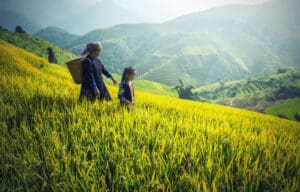Ever since the 1992 UN Earth Summit in Rio de Janeiro, local communities – in addition to Indigenous Peoples – have been recognized as vital for international instruments to achieve sustainable development.
Following the Summit, the United Nations Framework Convention on Climate Change (UNFCC) and the Convention on Biological Diversity (CBD) also recognized the rights and importance of these communities – explicitly and repeatedly. Examples of this recognition include the Safeguards of Cancún adapted at the 2016 UN Conference of the Parties (COP), and more recently the creation of the Local Communities and the Indigenous Peoples Platform (LCIPP) within the UNFCC framework.
Despite these repeated assertions though, an essential question remains unanswered: what really constitutes as a local community? Global institutions like UNFCC still lack clarity and consensus on the criteria for the identification and self-identification of local communities. It is critical to define these criteria because no community can exercise its basic rights or participate in the global climate agenda if there is ambiguity on who the rightsholders are.
Facilitated by the RRI coalition in Latin America, civil society organizations across the region have been working since 2019 to collectively define this much-needed criteria. RRI, in coordination with its members the Mesoamerican Alliance of People and Forest (AMPB) and the Process of Black Communities (PCN), have particularly helped bring Meso and South American rightsholders organizations on the same page by creating synergies between their efforts to advance this process.
Together, the organizations produced a preliminary proposal, shared at the first working group meeting of UNFCC’s LCIPP in June 2019. Following this proposal, community representatives and organizations from Brazil, Colombia, Guatemala, Honduras and Mexico organized a virtual workshop on July 31, 2020, where they worked together to collectively to complete the criteria and definition for local communities. These were then reviewed at two regional meetings held October 1 and 2 by a diverse set of organizations of local communities from Latin America and the Caribbean, including Afro-descendants and women.
The participants of the October meetings agreed to send the following criteria for identification and self-definition to the UNFCCC, CBD, national governments, and multilateral organizations serving the region. (Note: These criteria are still undergoing further development by organizations involved in this effort).
Criteria for identification and self-identification: A local community refers to the common space through which a collective relates to its territory, primarily through an interactive working relationship. This collective must meet the following criteria:
- Social identity and self-attribution: Its members recognize each other as part of the community and the community recognizes them as part of itself.
- A territory that is collectively managed, over which the community may hold a title or hold it in possession or make use of.
- One or several community economic activities as means of sustenance, characterized by their respect for nature and priority given to collective good rather than individual benefit.
- A shared history and culture.
- Authorities, representatives, organizations or governments of their own, based on their customs, practices and internal rules.
The goal is now for these agencies, governments and institutions to adopt this language into their frameworks, instruments and policies that affect local communities and their territories.
“Since the Rio Summit of 1992, the Convention on Climate Change and the CBD, these agencies have spoken of local communities but have not established criteria for recognizing them for their self-recognition – which prevents them from exercising their rights,” said Gustavo Sánchez, President of the Mexican Network of Forest and Farmers Organizations (MOCAF) and a member of the Meso American Alliance of Peoples and Forests (AMPB).
Sánchez cited Mexico as an example, where majority of ejido and farming communities identify as local communities. This identification could subsequently strengthen their rights, implementation of policies that affect them, and protection of their territories.
José Luis Rengifo from the Black Communities Process (PCN), a national organization that brings together a majority of Black community organizations in Colombia, added, “We, as representatives of peoples, groups and organizations with very diverse identities, have participated in constructing this proposed criteria for identification and self-identification of local communities.”
Rengifo stressed that if adopted by the UN agencies and national governments, this process will benefit Afro-descendants by strengthening their rights and voice in national and international settings.
Participants in the October meetings to finalize the criteria included academics and researchers from various countries. Including: Arturo Escobar (Colombia; Professor at the University of North Carolina, U.S.); Gonzalo Chapela y Mendoza and Conrado Márquez Rosano (Mexico; graduate researchers in rural regional development, Chapingo Autonomous University); Omaira Bolaños, RRI), and Tiffany Hodgson, UNFCC’s coordinator for LCIPP.
“RRI is pleased to have accompanied and supported this essential step toward ensuring greater inclusion and protection for local communities,” said Omaira Bolaños, RRI’s Director for Latin America and Gender Justice Programs. “Greater clarity on communities’ status and rights is an integral condition for any development, including Covid-19 recovery efforts, in order to be successful.”





